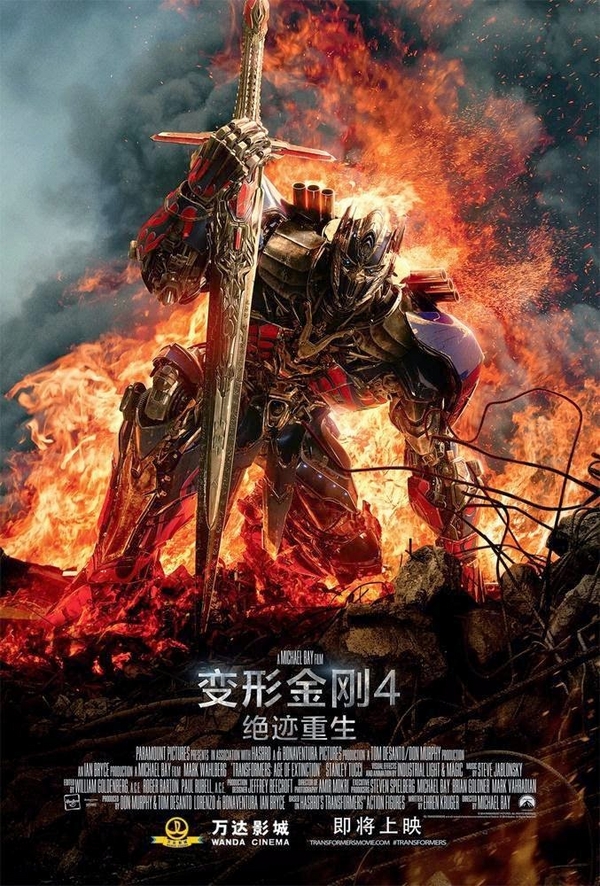By PETER BART and MIKE FLEMING JR
Peter Bart and Mike Fleming Jr. worked together for two decades at Daily Variety. In this weekly Sunday column, two old friends get together and grind their axes on the movie business.
Bart: Everyone I encounter in town this week seems fixated on Chinese takeout — only it’s finance, not food. Specifically, funding for films and theme parks. Here’s the catch: For every mogul who claims he’s made a ‘killer deal,’ I run into ten who say their deals imploded. “Once your deal closes with the Chinese, that’s when the real negotiations begin,” according to one veteran of the co-production process. Jeff Robinov and Ryan Kavanaugh may have announced megadeals, but will they get their money? On a smaller scale, look what just happened toParamount on their Transformers: Age Of Extinction deal – a Chinese partner (the Pangu Group) changed their minds when they saw the film and it endangered the China release of the movie. Two weeks ago China abruptly scrapped a giant alliance between the world’s three largest container-shipping companies, triggering confusion among Euro entities like Maersk as well as US lines.
Fleming: Pangu disagreed with how its Pangu Plaza property was displayed in Transformers, and used as pressure the threat of delaying China distribution to get its way. Everybody walks on eggshells in these China dealings, but after watching his Jiaflix dragged unfairly through the mud, former Academy president Sid Ganis called Pangu on it. He noted that in a court filing, Pangu demanded $1.8 million, which meant it would get the value of its product placement deal gratis. Hollywood is flocking to China the way so many did to California in 1849. Smart guys from Jeff Bergto Robinov, Kavanaugh, Ganis and a bunch of new production entities like Amasia, run by Michael Helfant and Bradley Gallo. I hope it works for all of them, but it seems each is betting on their politically connected liaison there. What if that person falls out of favor in this fast-shifting communist country that in five years will constitute the biggest moviegoing marketplace? Already, finance guys are questioning the solidity of Robinov’s China-based funding. Reliance continues to hang in with Steven Spielberg even though DreamWorks has been up and down. Reliance is India-based. If a China entrepreneur bails, is there recourse?
FTA can act as your Hollywood Celebrity Agency and help you contact book any Hollywood Celebrities.
Bart: Inhibiting the potentially lucrative co-production process is a long list of “no nos” imposed by Chinese censors. Movies can’t “re-interpret” history, depict the supernatural or display “gratuitous violence.” Those are the official censorship bans. Unofficially, movies can’t depict an American looking smarter than a Chinese character. Bruce Feirstein, the very successful writer of two James Bond films, who has written and produced several co-productions in China, tells me it’s a disastrous mistake for a movie to portray an American leading man who goes to China, does an action scene with, say, Jackie Chan, and then gets the girl. The Chinese girl, that is. “There are 650 million Chinese men who would not like that scene,” he reminds me.
Fleming: The communist government is telling studios upfront what can and cannot be in Hollywood movies that hope to play there. The potential Chinese audience is so large and growing so fast that even though distributors only get as high as 25% of the revenue—and none of the ancillaries that are worth hundreds of millions in other territories–studios are kowtowing to be among the 34-film annual quota. I’ve spoken to several parties, and beyond the examples you cited, they gave me some “suggestions” that everyone heeds if you are looking for entry, let alone a co-production designation (our international editor Nancy Tartaglione informs me that there hasn’t yet been a true China-Hollywood co-production yet, only cooperation agreements). The suggestions: no vigilante-ism; no civil disobedience; police and military can have guns, but no guns or serious violence by Chinese civilians; no Chinese villains unless they are from Hong Kong or Taiwan; no explicit sex; no Chinese prostitutes. On the genre front: no horror films; no ghosts, no vampires and no werewolves; no religious-based films; no time-travel movies.
There is wiggle room on some of these. Violence, guns and sex seem to be fairer game in historical/period pieces or in sci-fi/futuristic films, or if they occur outside mainland China. Then there is what might be called the “Dallas, Season Nine” rule: a twist ending where everything that happened was a dream. Also raising alarm bells: you might find trouble making villains of China allies like the Russians or North Koreans, but it’s perfectly acceptable if the villains are American, European or Japanese. And if your movie portrays China and its culture positively and takes that to an international stage, you’re In Like Flint. These benign, inoffensive, escapist studio summer movies fit the bill perfectly.
Bart: Maybe the Chinese demands should cause Hollywood to ask itself this question: How broadly should American movies re-shape themselves to accommodate not only China but all foreign markets? Hollywood decision-making already has been influenced by the fact that 70% of the audience is overseas — more superheroes, fewer dramas, etc. Now the content as well as the subject matter is changing. The marketing militia opposes scenes that will not play in Russia or Brazil — or China.
Fleming: We understand how sensitive foreign countries can be about film content, because some countries have such a mistrust of America they think movies are government propaganda. Misunderstandings over a crude video that wasn’t even a real movie but that maligned Muslim Prophet Muhammad caused riots and deaths in Egypt and Libya and that was tragic; just recently, reports had North Korea calling the upcoming James Franco–Seth Rogen comedy The Interview an “act of war” (it’s about hapless TV journos plotting to kill Kim Jong-Un). Unclear if the war declaration is directed to the U.S. or just Franco or Rogen, neither of whom seem nuclear capable. The South Parkguys are still around even though they lampooned a puppet version of Un’s father in Team America. These responses come after the fact. China gets to influence films in the hatching stage. That puts it in the catbird seat.
FTA can act as your Chinese Celebrity Agency and help you contact book any Chinese Celebrity
Bart: As American companies acquire an ever-growing stake in China, and other countries, it will be interesting to see whether they fare better than foreign companies have in Hollywood. Entities like Matsushita, Polygram and Sony have had rocky going in the U.S. China’s Wanda has taken a more conservative path in focusing on exhibition — but if it acquires an oligopoly will that darken the picture? Globalization is great on paper, often nasty in reality.
Fleming: Hollywood is a town built on Other People’s Money, and all the past international examples you mention lined the pockets of Hollywood more than those foreign corporations. The scales favor China right now, and that is a real sea change.
Source: https://www.deadline.com/2014/06/china-hollywood-future-or-folly/
FTA Foreign Celebrity booking agency in China & Chinese Celebrity bookings for the world
Tom Hardy, Luke Evans, Henry Cavill, Chinese Celebrity Agency, Chinese Celebrity booking, Hollywood Celebrity in China, Hollywood agent in China, 外模, 外籍演员, 外国艺人

